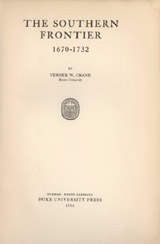The Counter-Revolution of 1776: Slave Resistance and the Origins of the United States of America (2014) by Gerald Horne (New York University Press), covers in granular detail part of what we look at in The American Slave Coast -- that among the driving forces of the American War of Independence were fear of abolition on the part of the southern elite slave holding class, and lust for Native land on the part of both north and south.

El V's and my bedtime read-aloud book has been The Southern Frontier: 1670 - 1732 (1929), * by Vernor W. Crane (Ann Arbor Press, University of Michigan), a history of South Carolina's traders, who were instrumental in the enslavement of Natives. The Nativeswere mostly sold to the Caribbean, particularly Barbados, in the 17th and earlier 18th century. This accomplished three of the objectives of South Carolina as a colony: to make money, get labor and remove Indians via enslavement and war from the western lands. Hopefully, all of it to the eastern bank of the Mississippi would be South Carolina, filled with plantations worked by slaves. These slaves were far and away preferred to be Negro slaves -- Africans -- rather than Natives, because the Natives could escape too easily to friends and relatives in the wilderness -- even up to French Canada.
This aspect of colonial slavery is something not much looked at, as part of what the goals of South Carolinians were from the beginning of the colony, which was always envisioned as a slave-based feudal economy and society. Horne doesn't look at it (as being outside the scope of his own work? As Crane's work is cited in Horne's own). However, his arguments are sound around the fundamentals of the Seven Years War or the French and Indian War as it was called here, base the causes of it on 1) fear of Catholic interference with slavery (Spain and France) and, 2) demand to rid themselves of Natives, for their land and because they, like Spain and France -- and England too, often, (which is where his argument gets contradictory and fuzzy at times) -- allied with "Africans" for rebellion and to take the colonies from white Englishmen by conquest.
 |
| I still have this 1992 copy. |
Oddly enough though, Outlander's dealing with the deeper questions of time
travel is more satisfying than is The Book of Life (2014), the conclusion of Deborah Harkness's All Soul's Trilogy. In the first two novels Harkness brought up so many deep questions between what makes life and the nature of time, and there is a great deal of time travel too. This is what lifted her series out of the commonality of most fantasy fiction, particularly fantasy fiction that features witches, demons and vampires. She was using fantasy tropes to delve into serious scientific questions. But she drops all these matters in The Book of Life in favor of the usual business of which alpha is the most alpha of all, and saving the world for supernaturals. Deeply disappointing -- and rather dull too. The saving grace for The Book of Life is, as in the previous books, the purely delightful witches' house. This is the most mysterious and wondrous element of the series.
This failure on the part of Harkness has to considered in light of her position, according to wiki:
professor of history and teaches European history and the history of science[4]at the University of Southern California.[5] She has published two works of historical non-fiction, John Dee's Conversations with Angels: Cabala, Alchemy and the End of Nature (1999) and The Jewel House: Elizabethan London and the Scientific Revolution (2007).[5]Gabaldon is a scientist: her MS in Marine Biology, Ph.D. in ecology, and was a university professor also, before becoming a full-time writer.
Ah well, I'll contemplate these matters under my Colombian sun shade hat, while I walk in the 90 degree muggy noon heat up to Union Square's Farmer's Market for peaches (even the local peaches are fabulous this year) and whatever else catches my fancy. Then -- a chocolate dipped Dairy Queen. Fortunately, the only Dairy Queen in NYC, is on 14th Street too, a couple of blocks west of Union Square. This may be the last day of summer here ....
-----------------------
* Such magnificent work these earlier generations of professors and scholars accomplished in those days -- without internet, databases (just bibliographies!), google, any of the tools that has so transformed historical research in the last two decades. Among the many benefits these digital tools have bestowed is how much more possible it is to be an independent scholar, rather than on a faculty as a tenured professor. Which is fortunate too for scholarship, as there are fewer and fewer tenured faculty for history departments everywhere. On the other hand these former scholars didn't live through publish or perish, and had a much more leisurely academic round than the changes brought to faculty and scholarship that were wrought post WWII -- and now to the point that faculty are hardly thought to matter -- any more than the students are thought to matter, other than cash cows to be milked for the real business of the academy now -- real estate moghulship.




No comments:
Post a Comment